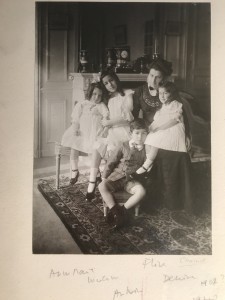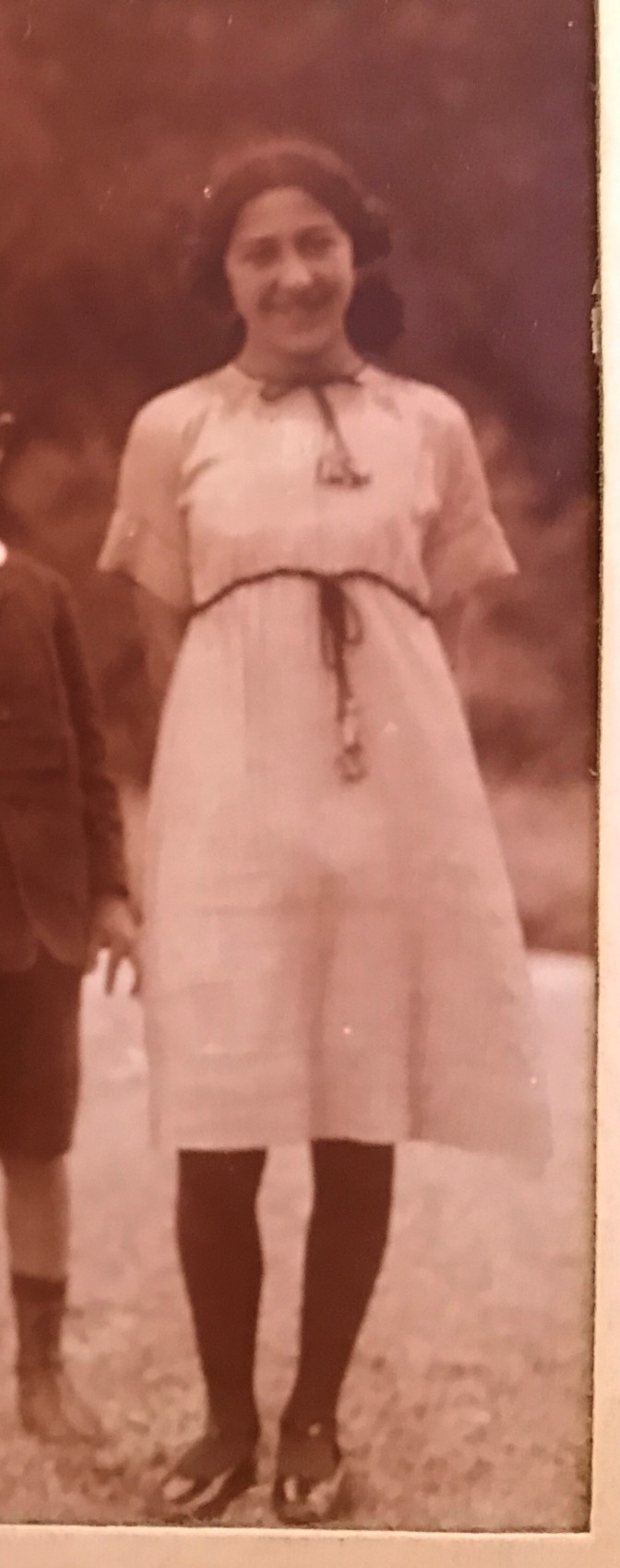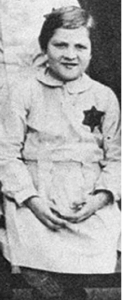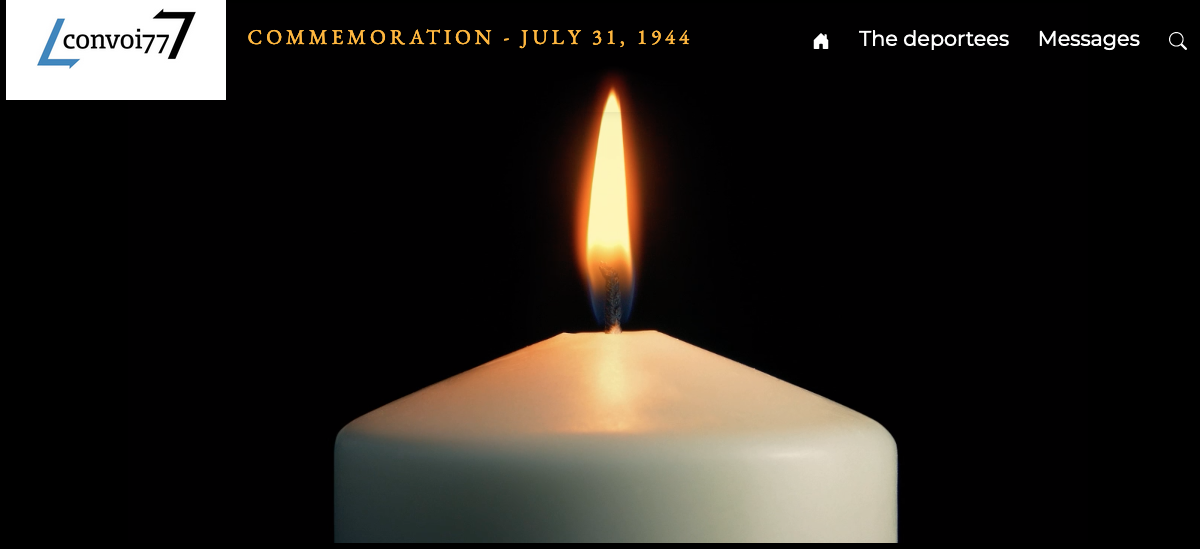Biography of Lucienne KLOTZ with historical references
This biography, as well as Denise’s, is dedicated to the memory of Florence Dollfus-Heilbronn, Gilbert Bloche, and Édith Bascou.
–
–
–
–
–
–
–
–
–
–
–
Lydie, Édith, Emma, Lucienne Klotz
Lucienne was born on September 10, 1899 at her grandparents’ home at n° 9 rue de Tilsitt in the 8th district, where each generation lived on its own floor [1]. Her mother, Flore Louise Hayem, was 20 years old; her father was thirty-two. She was the eldest of a family that was soon to be comprised of six children.
Why was she called Lucienne, which was only her third middle name? Was this customary name chosen in childhood or later? At the time of her first marriage she signed as L. Klotz. It is a very childlike signature, the capital “L” resembling that of a schoolchild.


Her father, Henry Klotz, worked in the Pinaud[2] perfume shop, which was run by her grandfather, Victor Klotz, and her great-grandfather, Émile Meyer. It was located on the Place Vendôme in Paris. Henry Klotz took over the management with his brother Georges in 1906. Pinaud perfumes were sold all over the world [3], with a shop on New York’s 5th Avenue and another on the rue du Faubourg Saint Honoré in Paris.
A 1907 photograph shows Flore and her children: the eldest Lucienne is holding her little sister Anne-Marie in her arms, while her brother Antoine is seated on a stool, and Denise, on her mother’s lap, is giving the photographer a mischievous look. The family is posed tenderly cuddling in front of the hearth.

In 1912 or 1913 the family was in Étretat at the family home of the grandparents Klotz. On the steps leading down to the garden the six Klotz children pose for the photographer. Who is it? Henry, Georges, or perhaps Victorine?
There is one child on each step from youngest to eldest: Lucienne, Antoine, Anne-Marie, Denise, François, with Philippe at the top.


They look quite well-behaved. Only Philippe has turned away, seeming to prefer the dog. That may well be why a second photo was taken, most likely a few minutes later, on the other side of the steps. Philippe is now sitting on the dog’s back, and Flore has come to hold him up. It must be spring or the end of summer, as they are rather lightly clad, but Lucienne is wearing tights under her dress.
In the third photo the children have gone down into the garden, Lucienne at their head. She smiles willingly at the photographer, while Denise playfully hides behind Anne-Marie. They are stationary for the photo.

When World War I broke out, Henry Klotz, the father, enlisted as a reserve officer [4], whereas he could have been exempted from service. Lucienne’s parents had divorced in July, 1914[5], and she found herself at the age of 15 in charge of the family, her youngest brother being only 4. She had been given a very strict upbringing. Did she attend the Hattemer institute? That school opened at the end of the 19th century on the rue Clapeyron in the 8th district. Or was she educated at home? When did she quit her studies? Quite probably after primary school in order to “keep her under control” in the family residence [6]. Girls were not intended to study, but to become homemakers in the middle classes in those times [7].
At 11:00 a.m. on March 25, 1921 Lucienne married Raymond Jacques Alfred Bloch, formally known as Bloche, at the town hall of the 17th district. Jacques was 29, Lucienne, 21. Jacques worked in industry; Lucienne had no profession. It was specified that he had received the “croix de guerre” war decoration. The bride and groom were both still living with one of their parents (Jacques Bloche with his mother, Lucienne with her father). The contract mentioned that she was the daughter of Lucien Henry Klotz and was of age.
Flore Louise Hayem[8], Lucienne’s mother, was present at the ceremony, but her father, who disapproved of the marriage, was not. The registrar who established the usual marriage license filled it out a bit hastily and had to cross out “in the presence of the bride’s father and mother“[9]. It was André Hayem[10] (also deported in Convoy 77), Lucienne’s cousin, who witnessed the marriage and signed the license. The other witness was an industrial worker, André Vallot.[11]
Gilbert was born on January 6, 1923. The couple was living at n° 16 rue des Banquiers in the 13th district [12]. They stayed there for six months [13]. Édith was born on July 19, 1925, at which time the couple lived at n° 83 rue des Saints-Pères [14].
Lucienne and Jacques divorced on April 29, 1930[15]. Gilbert and Édith went to live at their grandfather’s on the rue de Tilsitt with their great-grandmother. [the family council decided take charge of us, for my mother had neither the physical nor the financial means to bring us up [16]] Gilbert was eight, Édith six.
Gilbert recalls having “made up two years of school work” with the nanny employed by her grandmother, presuming that “he had not been previously enrolled in school”[17]. Lucienne rejoined them on the weekends at their grandfather’s, at first on the rue de Tilsitt, then from 1936 on the 7th floor of n° 8 Porte de Champerret [18]. She came to lunch and spent the afternoon with her children. The children were sent off to vacation camps, but never with one of their parents.
On December 16, 1939 she married Lucien Marie Joseph Pierre Foucaud at the town hall of the 14th district. They lived in that neighborhood at n° 20 rue Ernest Cresson. He was a journalist, already mobilized at the time of the wedding; she had no profession.
She lived at that address during the war. The building’s doorkeeper attested that she had been a tenant there since July, 1936[19]. In 1940 Édith and Gilbert moved to the Occupied Zone with their father. Édith, enrolled in a high school in Lyon, wrote her mother every week [20]. Her mother came to see her in June, 1944. Lucienne lived alone at that time [21], and Édith occupied a small efficiency at the same address as her mother.
Lucienne was arrested on July 12th by the Gestapo [22] at her home. She was then interned at Drancy on the 12th. Édith thought it was a man, whose name she forgot, who had caused 9 members of the family to be arrested. Her mother had introduced her to that man, who was supposed to help her make counterfeit papers.
It was therefore not an address book found at the residence of a member of the family that was responsible for the multiple arrests; nor was it Lucienne’s second husband, Pierre Foucaud. Édith saw him when he came to Paris, and he told her of Lucienne’s feeling that the self-styled resistance fighter was untrustworthy [23].
Lucienne was admitted to Drancy with the I.D. number 25078[24]. She was assigned to room 3[25] in stairway 19, along with Denise, Claudine Sergine, and Louise Ochsé.
A note[26] mailed from Drancy by André Julien Hayem on July 17th mentions the Klotzes’ internment : “Came across friends (illegible) and the Sergine and Klotz families, who arrived on the same day as me, as well as Fernand Ochsé.”
Lucienne was at Drancy for nearly three weeks. Two testimonies, taken after the war by Gilbert Bloche and dated December, 1945, were given by Zelda Ménassé and Léa Warech[27] in which they attest that she was sent to the gas chambers upon arrival at Auschwitz on August 4th. Zelda Ménassé wrote that she was surprised that Lucienne had been channeled toward the line of those inapt for work, for she “was[28] younger than her sister”. Gilbert supposes the decision had been made in France “to eliminate Lucienne because she knew who had informed on them”.
[1] Testimony from Édith Bascou (Lucienne’s daughter).
[2] Henry began working at the Pinaud perfumery in October, 1888 and became associate manager in December, 1897.
[3] The perfumery won several first prizes at the 1889 Paris universal exposition and the 1897 Brussels international exposition. A nursery was set up in the enterprise so that mothers could nurse their children, and the perfumery got a gold medal for this employer welfare benefit at the 1905 Liège international exposition.
[4] A note by Lieutenant-Colonel Gougelin, commander of the 38th army corps’ heavy artillery, dated December 29, 1918, attests that Henry Klotz, “father of six children could have been exempted from serving and commanded an ordnance unit and displayed on many occasions, in Champagne and at Verdun in 1916, the finest example of courage and devotion while resupplying the batteries under violent bombardment”. Henry fought throughout the war in an artillery regiment, ended up with the rank of lieutenant-colonel, and was awarded the rank of Officer of the Legion of Honor for military distinction.
[5] Marriage dissolved by a divorce decree granted on July 2, 1914 by the Paris Tribunal and officialized on May 15, 1915, specified on Henry and Flore’s marriage license
[6] Testimony from Édith Bascou (Lucienne’s daughter)
[7] Testimony by Gilbert Bloche (Lucienne’s son)
[8] Flore Louise Hayem was designated as the “spouse” of Henry Klotz, whereas she had been divorced for 7 years and was living at n° 19 rue Théodule Ribot in the 17th district.
[9] The registrar had to ask the newlyweds and their witnesses to endorse the deletions by signing again.
[10] Julien Hayem was then living at n° 94 boulevard Flandrin in the 16th district.
[11] André Vallot lived at the same address as Flore.
[12] Gilbert Bloche’s birth certificate
[13] Testimony by Gilbert Bloche (Lucienne’s son)
[14] Édith Bloche’s birth certificate (archives of the Paris town hall)
[15] Transcription of the decree on September 9, 1930 (archives of the Paris town hall)
[16] Testimony from Gilbert Bloche (Lucienne’s son)
[17] Testimony from Gilbert Bloche (Lucienne’s son)
[18] After the 1929 crash Henry and Georges were compelled to sell the perfumery in 1936.
[19] Attestation of residence dated January 5, 1946, in which Madame Bourdeau, the building’s concierge, certified that Lucienne had been a tenant up to July 12th (mistaken date — July 11th ?),”the date of her arrest by the Germans” (with two spelling mistakes by Mme Bourdeau in the Caen archives, file n°44.711/22P 451 150)
[20] Édith had kept until very recently all the letters written by her mother, but had to dispose of them for lack of room.
[21] Testimony by Gilbert Bloche (Lucienne’s son)
[22] Attested in two testimonies, that of the concierge of the building (cf. footnote 20 above) and that of Jacques Bloche, which specifies that it was the Gestapo that came to arrest Lucienne (archives of Caen, file n°44.711/22P 451 150)
[23] Édith specifies in her testimony that this man was probably not an anti-Semite, but that he had acted for the money.
[24] Georges was given I.D. number 25009, Denise 25089, Fernand Ochsé 25067, Louise Ochsé 25068, André Julien Hayem 25080, Maurice Sergine 25086, Claudine Sergine 25087 (archives of the Mémorial de la Shoah)
[25] Cf. transfer register of the Drancy camp (Mémorial de la Shoah)
[26] Letter from André Julien Hayem to his wife (called Bady, perhaps an assumed name?/ Germaine Marie Badiller), addressed to n° 24 rue des Marronniers in the 16th district (archives of Caen, file n°44.711/22P 451 150)
[27] Admitted to Drancy with I.D. number 25084, assigned to room 3, stairway 19. (Archives of the Mémorial de la Shoah)
[28] Zelda Menassé mistook Lucienne’s age, as she was the eldest child, six years older than Denise, perhaps because of her physical appearance resulting from a bout with polio in her childhood.
A poetic endeavor on Lucienne KLOTZ, undertaken by the 9th-grade class of the Charles Péguy junior high school (middle school) in Palaiseau.
The biographies by the pupils : 3 poems, two of which are reproduced here — Childhood (dedicated to both sisters) and Lucienne’s. The one in prose is reproduced below the biography of Denise.
The forms of the three poems are taken from those evolved over time, expressing the stages of life: from strict sonnet form, through the dissonance of verses with an irregular beat, and then to more modern poetic prose. The literary genre of poetry opened the students’ imagination to certain phases of the lives of Lucienne and Denise left blank by historical research.
Childhood
Lucienne, though born before the century’s turn
And eldest of her siblings, not yet old
But burdened by her family’s cumbrous hold,
Peered at the world with guileless unconcern.
Denise was mischievous eyes, warmhearted wiles,
Oblivious childhood just a gentle breeze
That every morning stroked her cheek to tease
Sweet scents of joyous laughter, gleeful smiles.
Four other caring children with them grow –
An affluent clan, but Jewish, to their woe!
Drowned in that terrible century’s undertow.
Alternate ending with sloppy meter and no rhyme, truer to the original but not to music:
Bolstered by their four fraternal mates,
Their affluent clan was Jewish, such harsh fates!
Sucked under in Paris’s twentieth-century flow.
Lucienne
Lucienne grew up and ripened but never left the nest
And finally when the times were right her life was blessed
The dove’s a bride already all in snow-white dressed
And so embarked on a brand-new life at Jacques’ behest
And then of course of all life’s miracles the best
Laughter, tears, and joy wrapped up in love’s bequest
A cherished son soon kept by Édith’s birth from dull unrest
And brother sister father mother dwelt in Paris’ breast
But after that black Thursday hope just seeped away
And the fissured foursome wound up being smashed


 Français
Français Polski
Polski










selon le dossier de Suzanne Warech, arrêtée le 11 juillet, Denise Klotz l’aurait été en même temps qu’elle. Elles ont été emmenées rue des Saussaies, puis Suzanne a été gardée à la préfecture pour interrogatoire. On peut imaginer une autre version des arrestations du 12 juillet : la gestapo a trouvé les adresses dans les affaires de Denise…et a arrêté toute la famille, comme c’était souvent le cas. En tout cas, il va falloir vérifier…
Convoi 77 et tant et tant d’autres…….Hélas.
[…] qui fait un remarquable travail de mémoire avec les scolaires a dressé une biographie de Lucienne et Denise Klotz. Selon l’un des témoignages recueillis, c’est un homme se présentant […]